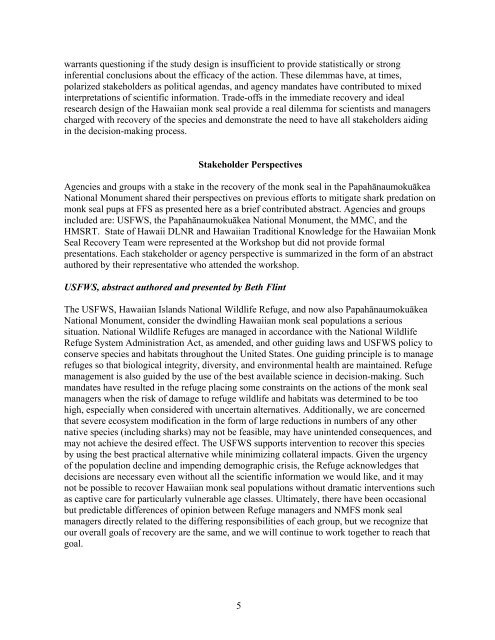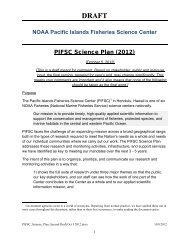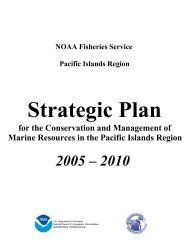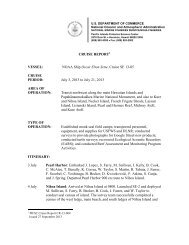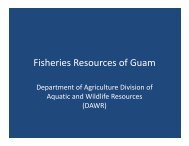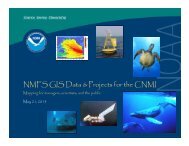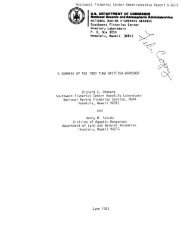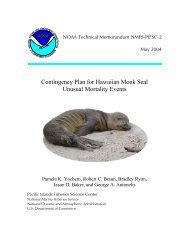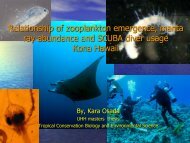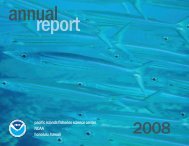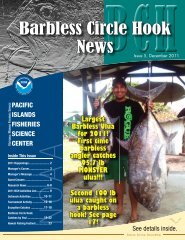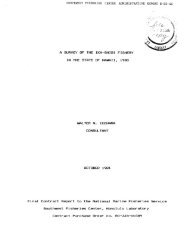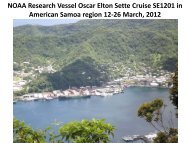Shark Predation on Hawaiian Monk Seals - Pacific Islands Fisheries ...
Shark Predation on Hawaiian Monk Seals - Pacific Islands Fisheries ...
Shark Predation on Hawaiian Monk Seals - Pacific Islands Fisheries ...
You also want an ePaper? Increase the reach of your titles
YUMPU automatically turns print PDFs into web optimized ePapers that Google loves.
warrants questi<strong>on</strong>ing if the study design is insufficient to provide statistically or str<strong>on</strong>g<br />
inferential c<strong>on</strong>clusi<strong>on</strong>s about the efficacy of the acti<strong>on</strong>. These dilemmas have, at times,<br />
polarized stakeholders as political agendas, and agency mandates have c<strong>on</strong>tributed to mixed<br />
interpretati<strong>on</strong>s of scientific informati<strong>on</strong>. Trade-offs in the immediate recovery and ideal<br />
research design of the <strong>Hawaiian</strong> m<strong>on</strong>k seal provide a real dilemma for scientists and managers<br />
charged with recovery of the species and dem<strong>on</strong>strate the need to have all stakeholders aiding<br />
in the decisi<strong>on</strong>-making process.<br />
Stakeholder Perspectives<br />
Agencies and groups with a stake in the recovery of the m<strong>on</strong>k seal in the Papahānaumokuākea<br />
Nati<strong>on</strong>al M<strong>on</strong>ument shared their perspectives <strong>on</strong> previous efforts to mitigate shark predati<strong>on</strong> <strong>on</strong><br />
m<strong>on</strong>k seal pups at FFS as presented here as a brief c<strong>on</strong>tributed abstract. Agencies and groups<br />
included are: USFWS, the Papahānaumokuākea Nati<strong>on</strong>al M<strong>on</strong>ument, the MMC, and the<br />
HMSRT. State of Hawaii DLNR and <strong>Hawaiian</strong> Traditi<strong>on</strong>al Knowledge for the <strong>Hawaiian</strong> M<strong>on</strong>k<br />
Seal Recovery Team were represented at the Workshop but did not provide formal<br />
presentati<strong>on</strong>s. Each stakeholder or agency perspective is summarized in the form of an abstract<br />
authored by their representative who attended the workshop.<br />
USFWS, abstract authored and presented by Beth Flint<br />
The USFWS, <strong>Hawaiian</strong> <strong>Islands</strong> Nati<strong>on</strong>al Wildlife Refuge, and now also Papahānaumokuākea<br />
Nati<strong>on</strong>al M<strong>on</strong>ument, c<strong>on</strong>sider the dwindling <strong>Hawaiian</strong> m<strong>on</strong>k seal populati<strong>on</strong>s a serious<br />
situati<strong>on</strong>. Nati<strong>on</strong>al Wildlife Refuges are managed in accordance with the Nati<strong>on</strong>al Wildlife<br />
Refuge System Administrati<strong>on</strong> Act, as amended, and other guiding laws and USFWS policy to<br />
c<strong>on</strong>serve species and habitats throughout the United States. One guiding principle is to manage<br />
refuges so that biological integrity, diversity, and envir<strong>on</strong>mental health are maintained. Refuge<br />
management is also guided by the use of the best available science in decisi<strong>on</strong>-making. Such<br />
mandates have resulted in the refuge placing some c<strong>on</strong>straints <strong>on</strong> the acti<strong>on</strong>s of the m<strong>on</strong>k seal<br />
managers when the risk of damage to refuge wildlife and habitats was determined to be too<br />
high, especially when c<strong>on</strong>sidered with uncertain alternatives. Additi<strong>on</strong>ally, we are c<strong>on</strong>cerned<br />
that severe ecosystem modificati<strong>on</strong> in the form of large reducti<strong>on</strong>s in numbers of any other<br />
native species (including sharks) may not be feasible, may have unintended c<strong>on</strong>sequences, and<br />
may not achieve the desired effect. The USFWS supports interventi<strong>on</strong> to recover this species<br />
by using the best practical alternative while minimizing collateral impacts. Given the urgency<br />
of the populati<strong>on</strong> decline and impending demographic crisis, the Refuge acknowledges that<br />
decisi<strong>on</strong>s are necessary even without all the scientific informati<strong>on</strong> we would like, and it may<br />
not be possible to recover <strong>Hawaiian</strong> m<strong>on</strong>k seal populati<strong>on</strong>s without dramatic interventi<strong>on</strong>s such<br />
as captive care for particularly vulnerable age classes. Ultimately, there have been occasi<strong>on</strong>al<br />
but predictable differences of opini<strong>on</strong> between Refuge managers and NMFS m<strong>on</strong>k seal<br />
managers directly related to the differing resp<strong>on</strong>sibilities of each group, but we recognize that<br />
our overall goals of recovery are the same, and we will c<strong>on</strong>tinue to work together to reach that<br />
goal.<br />
5


